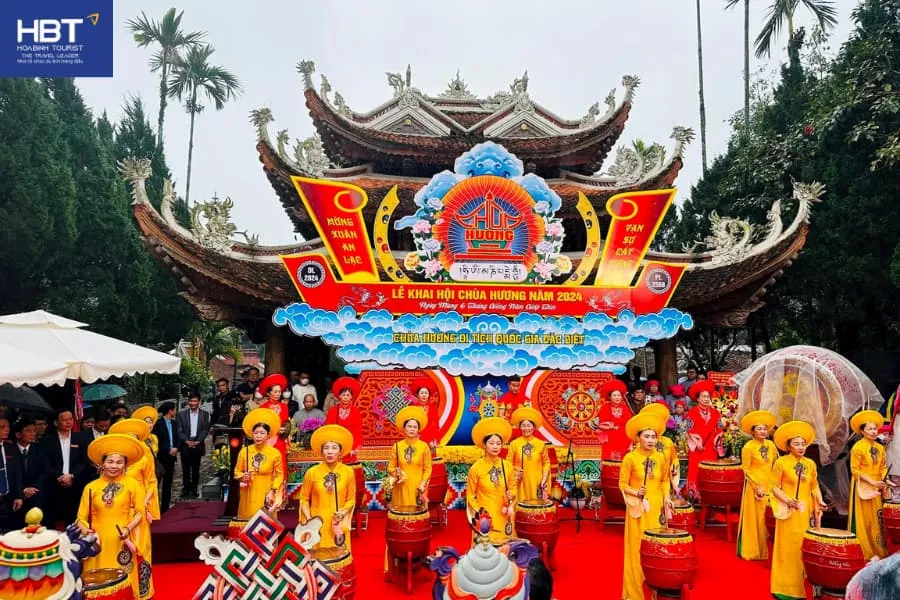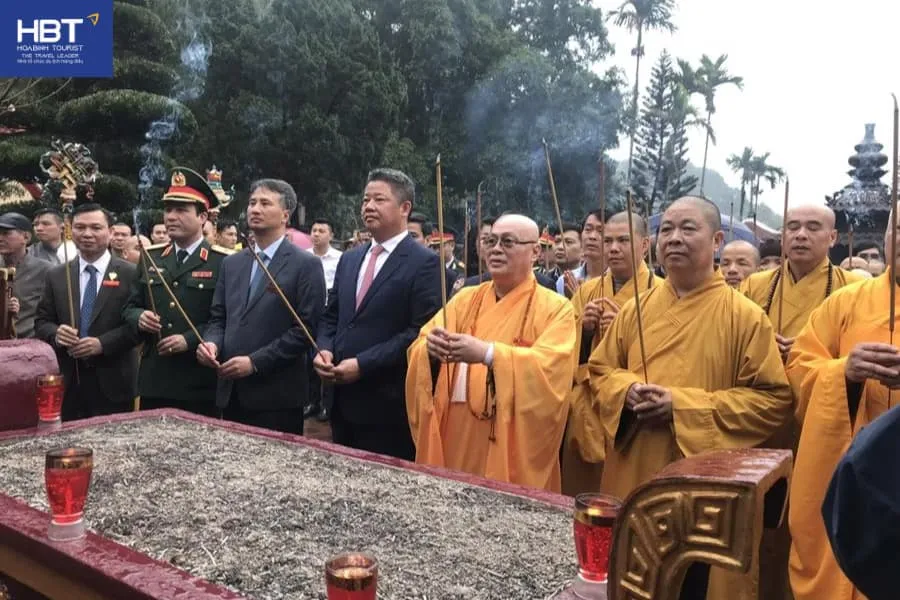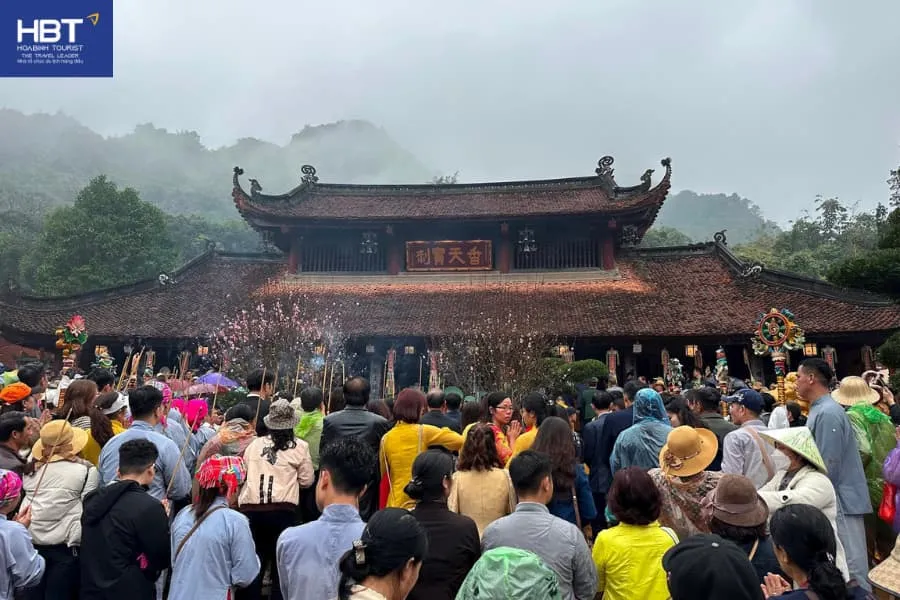As peach blossoms brighten the Hương Sơn mountains, millions turn their hearts to the Perfume Pagoda Festival, one of Vietnam’s largest and most sacred spiritual events. This is more than just a spring outing; it’s a chance to reconnect with origins, offer wishes, and immerse oneself in a rich cultural space. Are you ready for a truly meaningful Perfume Pagoda Festival experience?
Discovering the Perfume Pagoda Festival: Essence of Vietnamese Culture and Beliefs
Where is Perfume Pagoda?
The Perfume Pagoda Festival takes place at the Perfume Pagoda scenic area, also known as Hương Sơn, in Hương Sơn commune, Mỹ Đức district, Hanoi. Located approximately 62km southwest of the capital’s center, Perfume Pagoda is not only a famous tourist destination but also a special spiritual site, attracting Buddhists and tourists from all over the country for pilgrimage and prayer.

Perfume Pagoda is a unique religious architectural complex, with Hương Tích Cave, also known as the Inner Pagoda, as its centerpiece, hailed as “The foremost cave of the Southern Sky.” This place is not only famous for its majestic beauty but also the heart of the Perfume Pagoda Festival, attracting millions of visitors each year.
Perfume Pagoda Festival Time
The Perfume Pagoda Festival usually opens on the 6th day of the Lunar New Year and lasts for 3 months. In 2025, the festival is expected to begin on February 4th, 2025, in the Gregorian calendar. The peak festival season typically falls from the full moon of the first lunar month to the 18th day of the second lunar month, corresponding to mid-February to early March in the Gregorian calendar. This is the ideal time to fully experience the festival atmosphere and admire the beauty of Hương Tích Cave.
Origin and Significance of the Perfume Pagoda Festival
The Perfume Pagoda Festival is associated with the worship of Lady Buddha, the incarnation of Avalokiteśvara Bodhisattva, Princess Diệu Thiện. Legend has it that Princess Diệu Thiện practiced asceticism for 9 years in Hương Tích Cave and attained enlightenment, becoming a Buddha to save sentient beings. The day the princess became Buddha, the 19th day of the second lunar month, is considered Buddha’s Birthday and the origin of the Perfume Pagoda Festival.
In 1770, Lord Trịnh Sâm of Tĩnh Đô Vương, during a tour, visited Hương Tích Cave and inscribed the five words “Nam Thiên Đệ Nhất Động” (The foremost cave of the Southern Sky) on the cliff, praising its exquisite beauty. This act not only elevated the status of Hương Tích Cave but also significantly contributed to the development of the Perfume Pagoda Festival. By 1896, under the reign of Thành Thái Emperor, the Perfume Pagoda Festival was officially organized on a large scale, becoming one of the largest festivals in the country, attracting millions of tourists and Buddhists to participate in praying for peace and good fortune.

The Perfume Pagoda Festival is not just a spring pilgrimage but also carries profound cultural, spiritual, and religious significance for Vietnamese people. It is a convergence of national culture, demonstrating a unique intersection of Confucianism, Taoism, and Buddhism. The festival is also a symbol of community solidarity, as people from all over the country gather, sharing joy and cultural values.
Unique Experiences at the Perfume Pagoda Festival
Spiritual Rituals During the Festival
The ceremonial part of the Perfume Pagoda Festival includes solemn rituals with profound meanings:
- Mountain Opening Ritual (Khai Sơn): Held on the morning of the 6th day of the Lunar New Year, it is an opening ritual to thank the mountain gods and pray for a peaceful new year with favorable weather.
- Incense Offering Ceremony (Lễ dâng hương): Devotees and visitors offer incense at Hương Tích Cave to express their sincerity and pray for health, peace, and good fortune.
- Worship Ceremony (Lễ cúng bái): Monks and nuns perform traditional worship rituals at the Inner Pagoda and other places of worship.
- Pilgrimage (Hành hương): Buddhists and people go on pilgrimages through places of worship such as Hương Tích Cave, Trình Temple, Thiên Trù Pagoda, and other scenic spots in the area.
Fun and Entertainment Activities During the Festival
Besides spiritual rituals, the Perfume Pagoda Festival also features many exciting folk games, imbued with Vietnamese traditional culture:
- Boat rowing: Boating along the poetic Yến Stream, admiring the beautiful natural scenery.
- Còn throwing contest (Thi ném còn): A game showcasing the dexterity and martial spirit of the Vietnamese people.
- Tug of war (Kéo co): A team game, demonstrating the strength and solidarity of the community.
- Clay pot smashing (Đập niêu đất): A game of chance, attracting many participants.
- Wrestling (Đấu vật): Exciting martial arts performances, showcasing the nation’s martial spirit.
- Releasing lanterns (Thả đèn hoa đăng): A romantic activity, symbolizing prayers for peace and good fortune.

Perfume Pagoda Sightseeing Routes
The Perfume Pagoda scenic area has many different sightseeing routes, helping you fully explore the beauty of this place:
- Hương Tích Route: The main and most popular route, leading to Hương Tích Cave, passing through Trình Temple, Thiên Trù Pagoda, Tiên Sơn Cave, Giải Oan Pagoda, Trần Song Temple, and Hinh Bồng Pagoda.
- Thanh Sơn Route: A quiet sightseeing route, suitable for those who want to explore Thanh Sơn Pagoda and Hương Đài Cave.
- Tuyết Sơn Route: A pristine sightseeing route, taking you to Bảo Đài Pagoda, Chùa Cá Cave, and Tuyết Sơn Cave.
- Long Vân Route: A sightseeing route to explore fascinating caves and Long Vân Pagoda, Long Vân Cave, Sũng Sàm Cave.
Perfume Pagoda Festival “Pilgrimage” Experiences
Directions to Perfume Pagoda
You can easily get to Perfume Pagoda by various means of transport:
- Motorbike: Suitable for young people who want to be proactive with their schedule, following the Nguyễn Trãi – Hà Đông – Ba La intersection – National Highway 21B route (about 1 hour 30 minutes).
- Car: Suitable for large groups or families, going through Pháp Vân – Cầu Giẽ expressway, turning right at Đồng Văn junction onto National Highway 38, continuing for 15km towards Dầu market (about 1 hour).
- Bus: Economical and convenient with bus routes 103 (Mỹ Đình – Hương Sơn), 75 (Yên Nghĩa – Hương Sơn), or 215 (Giáp Bát – Hương Sơn).
Upon arrival at Perfume Pagoda, you will take a boat along the Yến Stream to reach the pagodas and caves.
Entrance Fees, Cable Car Tickets, and Boat Tickets
- Entrance ticket to the relic site: 80,000 VND/person
- Boat ticket:
- Main Hương Tích route: 50,000 VND/person/round trip
- Tuyết Sơn, Long Vân routes: 35,000 VND/person/round trip
- Cable car ticket:
- Adult: 120,000 VND/one-way ticket, 180,000 VND/round trip ticket
- Children: 90,000 VND/one-way ticket, 120,000 VND/round trip ticket (under 1.3m)

Notes When Visiting Perfume Pagoda Festival
- Check the schedule and plan ahead, especially for the opening day and peak days.
- Book accommodation in advance if you plan to stay overnight.
- Choose polite, discreet clothing and comfortable shoes.
- Prepare offerings and snacks, drinks.
- Keep personal belongings safe.
- Bargain before buying specialties and souvenirs.
- Choose a reasonable departure time to avoid traffic jams.
- Respect the festival space and maintain general hygiene.
Conclusion
A Perfume Pagoda Festival experience is not just a spring outing but also an opportunity for you to reconnect with your roots, explore the profound cultural and spiritual values of the nation. Hopefully, with the above information and experiences, you will have a truly fulfilling, meaningful, and memorable trip. Are you ready to immerse yourself in the sacred and bustling atmosphere of the Perfume Pagoda Festival?